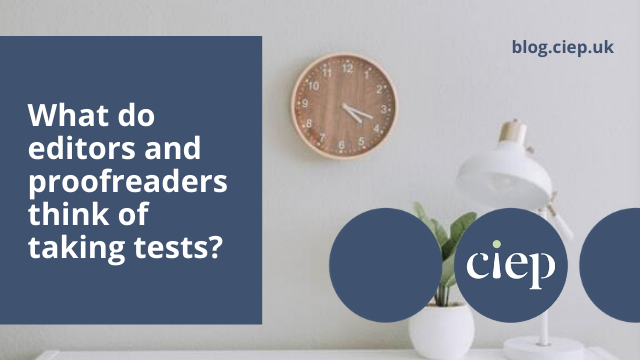We asked our freelance members for their opinions about editing and proofreading tests: tests set by a potential client to assess the freelancer’s suitability for the job. Here, four CIEP members share their thoughts on the topic.
 Alex Mackenzie
Alex Mackenzie
This was a timed proofread I’d been asked to do as part of a job application. The email said they’d send me a document at 10am; I was to proofread it and return it an hour and a half later. Heart racing, I began, wide-eyed and focused. Ninety-one minutes later, of course, reassessing my sent work, I spotted a mistake! The test had been simple enough, basically a simulation of the company’s typical report: one table (misaligned and missing information), one graphic (valuable seconds lost trying to edit that insert), logos and company branding (creative capitalisation), finishing with a wordy biography (university degrees and excessive work experience). But that ticking clock, I thought, was an unnecessary pressure. And my obvious mistake wouldn’t have escaped a re-read or a PerfectIt scan. Oh well, I huffed – I’ll put that down to experience. Three months later I was hired – they’re now a regular client, paying CIEP suggested minimum rates!
Other than that, I’ve completed test edits for academic proofreading agencies. I remember Janet MacMillan’s words in one of my early Cloud Club meetings: give it an hour, there’s nothing to lose. True. This approach has landed me two more jobs, meaning (low-paid) editing work pops into my inbox weekly. I consider it all training!
 Laurie Duboucheix-Saunders
Laurie Duboucheix-Saunders
In the best of all possible worlds, editors with a proven record of training and experience should not have to take editorial tests.
However, personally, I have found that such tests have opened doors for me that would otherwise have remained closed. English is not my first language and my degrees in English Lit from the Sorbonne and the fact that I have been an Advanced Professional Member of the CIEP since 2016 are not enough to stop people from asking whether I can, or even should, edit or proofread an English text because I am not a native speaker.
I use that term even though it has become controversial in more enlightened editorial circles – where multilingual is preferred – because those editorial tests have allowed me to get work based on my abilities and expertise alone, regardless of where I come from. As with exams that are marked blind, they are an objective assessment of a candidate’s skills and knowledge.
As I write this, I worry that my argument could be used to support the use of editorial tests specifically for non-native editors. This is a million miles away from what I’m trying to say. A strong CV and proven training in editing English material should be enough for people like me to get the job. As it’s not the case yet, I’d rather take a test than be ruled out systematically simply because I am not originally from an anglophone country.
Louise Bolotin*
I’m not opposed to sitting editing tests, but I’m not wild about them. I believe my many years of experience and my Advanced Professional Member status in the CIEP should speak for themselves and indicate my competence. My CIEP directory entry, my website and LinkedIn profile are all places a prospective client can look at my CV, a sample client list and client testimonials. On that basis, I won’t take a test for a small company or a private individual such as an independent author. However, I might – if the job looks really interesting and I really want it – offer to do a free one-page sample. No more, and beyond that I’m happy to agree to a week’s (paid) trial or some such, to see how we work together. I do sit editing tests if required where it involves a major rolling contract. I recently took one for a government inspectorate, where passing the test was a prerequisite for joining the freelance pool. I’ve also taken tests for publishing companies for the same reason, but these tests should never be more than a couple of pages and should never take more than around 90 minutes to complete. If they are any longer, you should be paid for your time.
Caroline Petherick
While it’s reasonable for a client to want to have some indication of competence in a freelance editor or proofreader they’re thinking of hiring, the idea of testing a qualified and experienced editor is, in my view, not just out of date but near enough insulting.
As I understand it, the concept arose in the publishing industry in the mid-20th century, an era when many publishing houses were getting rid of their in-house editors in favour of freelance editors and proofreaders, who required less commitment, both financial and pastoral. That was (and still is) seen as an important move in this cut-throat industry.
Until the mid-20th century, copyeditors and proofreaders were quite likely to have been wives of publishers – and unpaid. That view of the profession lingered long in the publishing industry, to its financial advantage. Throughout the 20th century (and in some cases into the 21st), it clearly suited the publishing houses to continue to perceive the proofreader and copyeditor as lowly individuals at the bottom end of the status ladder.
But with the new freelance system, how could a publisher establish editorial competence? A test designed to include the classic traps was obviously deemed appropriate.
Now that we editors and proofreaders have made our mark as independent professionals, due to the formation of the SfEP – now the CIEP, a chartered organisation with registered members and clear status – it is clear that a potential client asking a CIEP member to take a test would be as incongruous a request as, for example, asking a qualified lawyer, designer or accountant – or even a Gas Safe engineer! – to do so. (To be fair, though, it’s probably only a few publishing houses who might still ask for a test. The myriad of other types of clients are highly unlikely to do so.)
The balance of power has changed. And not before time.
A sample edit is, however, as I see it, crucially important. And here, editorial professionals have an advantage over lawyers, designers, accountants and plumbers in their dealings with clients. In working on a sample, a CIEP member will not only be showing the client what work they’d carry out, but they will be assessing the text and, to some degree, the client. And then, having seen what the client produces, they’ll also be able to quote a fair price for the work. All part of the professional package.
Wrapping up: editing tests
This post has presented the opinions of four CIEP members on editing tests, and it shows the breadth of views there are on the topic.
Have you taken an editing or proofreading test? Or have you set one as a way to assess a freelancer’s abilities? Tell us more in the comments.
Ayesha Chari has written about her experiences of editing tests.
*Louise Bolotin died in October 2022; her contributions are much missed.
The CIEP is no longer using the terms ‘native’ and ‘non-native’ to describe English language familiarity and competence. Where these terms appear on our site or within our materials, it will be to honour an author with relevant lived experience or to highlight their problematic use.
For more information, please read ‘”Non-native” and “native”: Why the CIEP is no longer using those terms’.
September 2021
 About the CIEP
About the CIEP
The Chartered Institute of Editing and Proofreading (CIEP) is a non-profit body promoting excellence in English language editing. We set and demonstrate editorial standards, and we are a community, training hub and support network for editorial professionals – the people who work to make text accurate, clear and fit for purpose.
Find out more about:
Photo credit: clock by Samantha Gades on Unsplash



I was contacted a while ago by an organisation I didn’t know. Was I interested in doing a test? I did it, because you never know where it might lead.
Months later, they told me that I was not up to standard, as I had missed several things, which they listed. One of the items rang a bell, so I had a look at my test. I had not missed anything on their list of “errors”.
I think I had a lucky escape, because if they can’t organise a test, they are probably disorganised in other ways. But it was annoying, and has made me more reluctant to do tests.
I’ve just remembered Albert’s Law of Late Literals: authors will spot a mistake as soon as it is too late to do anything about it.
I’ve remembered it because what I should have said in my piece and didn’t – because I’d taken it for granted – was that the sample I was on about needs to be extracted at random from the text to be edited, ideally from somewhere in the middle of it.
I always ask for a sample from the middle, ideally around 10 pages, so I can assess the time it will take to edit the entire document.
The editing test I most regret was the one I took in around 2008, when I briefly considered going back to a staff job. I did well in the interview, which was with a very large publishing company, and was asked to sit a one-hour editing test. I was invited back a week later for a second interview. That went well too and they offered me the job on the spot. Then they told me the salary – entry-level money, but they wanted someone with my level of experience and skill and should have been paying at least double for the privilege. I declined the offer, citing the reason why, and pointed out that if they’d put the salary range in the job ad I wouldn’t have applied. It was a waste of everyone’s time, especially when they said it was my high pass rate on the editing test that had swung it for them.
LOL! Snap!
A few years ago, I, ever keen on working on travel-related texts, agreed to edit a sample provided by a well-known British travel guide publisher. From the number and range of errors, both egregious and subtle, typographical and factual, including several mismatches between text, sketch map and illustrations, it became abundantly clear to me that this was in fact a test that the company had set up. Nevertheless I worked through the text, and in addition I drew up a table categorising relevant errors into types and providing their solutions.
The company was thrilled, and offered me the commission right away. For the princely sum of about £10 per hour.
And the moral of that story is: before investing time on a sample/test agree an approximate fee!